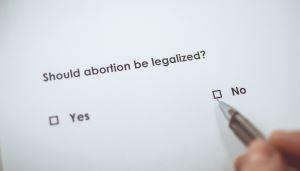Abortion in Jamaica: Constitution and Coloniality

Blog post by Dr Jill St George
Abortion is a topic that, understandably, invokes varying thoughts, feelings and opinions, be they strong or weak, undecided or veering, static or malleable. The topic gained increased coverage in 2022 following the reversal of Roe v Wade 410 U.S. 113 (1973) by the US Supreme Court, in which the court majority declared that there was no longer a constitutional right to abortion. The decision was received by some with joy, others with despair, but regardless of opinion, the question arose, and the resulting answer by the Supreme Court sparked debate and discussion on reproductive rights, spreading across the globe.
Although engaging and interesting, what the decision of the Supreme Court sparked in me was not the desire to debate the US structure of abortion and how it would change following the decision, but to look further afield. What about the law elsewhere? Whilst focus was on the ‘landmark’ Supreme Court decision, persons in other jurisdictions had been living under restrictive legal environments governing abortions for decades. They just didn’t receive the same level of press coverage.
There are a number of jurisdictions which maintain restrictive laws determining access to abortion in the Commonwealth Caribbean, one of which is Jamaica (for context, I should note that I have a personal and professional relationship with the region, hence the pivot towards it!).
The Jamaican 1864 Offences Against the Person Act (OAPA 64) provides the legal framework for abortion. Under S72, abortion is criminalised under all circumstances. Any woman who seeks to procure an abortion, and any person who uses drugs, poisons, noxious substances, instruments or other means to procure an abortion, commits an offence. The penalty is a maximum of life imprisonment. S73 criminalises the supply or purchase of material intended for abortions, and the penalty is up to 3 years custodial sentence.
In 1975 the then Jamaican health minister sought to propose legislation decriminalising abortion, but institutions rallied against it. Instead, a policy of providing abortion services at a single health clinic was enacted, which was refined and affirmed in 1989. However, this does not amount to a Government policy and provides no legal protection to individuals or medical professionals who are at risk of prosecution if they are found to be in contravention of the OAPA 64.
Academic and anecdotal evidence indicates a high prevalence of abortions are carried out, either with or without medical supervision/intervention. [1] Research confirms the disproportionate impact of restrictive environments on young people, those of a lower socio-economic status and those identified as migrants (in particular those without a recognised migration status).[2]
The question then, is why?
The answer isn’t as straightforward as one might expect, or perhaps is as complex as one would hope. In my opinion, the answer to ‘why’ mandates consideration of a number of legal, historic, religious and cultural notions, all of which are operating in a domain of tandem and/or conflict.
The first port of call when discussing restrictive legal frameworks governing abortion is often religion. And religion is relevant to the discussion in Jamaica (Hope Enterprise Ltd (2006)) - a state which is predominantly Christian, where the Church plays an active role in culture and society, and, importantly, this relationship has strong links with colonialism and slavery.
Which leads me to the next consideration, independence and Constitutions. Jamaica gained independence from Great Britain in 1962, one of the first in the region, along with Trinidad and Tobago in 1962 and Barbados in 1966. When drafting early Commonwealth Caribbean constitutions, it was decided that they should contain a savings clause- a section of the constitution which declares that law existing prior to independence remains valid, even if in breach of constitutional provisions. The justification for savings clauses was to support the transition from colony to independent, ensuring legal stability and preventing uncertainty. “(S)avings clauses served a historical purpose in avoiding the legal uncertainty which the unqualified introduction of a written Constitution would have entailed.”[3]
Whilst this may have been the aim, the legacy has been that of stagnating law, fixing it in time and legitimising incompatibility with both emerging and established human rights norms. Those same norms deemed worthy of explicit constitutional inclusion.
So what can be done? The criminalisation of abortion as in the OAPA 64 is saved as a law, even if deemed unconstitutional. If doubt existed as to this position, the Charter of Fundamental Rights and Freedoms (Constitutional Amendment) Act 2011 confirmed it, explicitly excluding ‘offences related to the unborn’ as capable of being challenged under the new, fundamental rights and freedoms Act. That settles it then – ‘offences relating to the unborn’ cannot be challenged as unconstitutional, not through the rights and freedoms guaranteed in the 1962 Constitution, nor through rights and freedoms guaranteed in the 2011 Constitutional Amendments Act. The 2011 inclusion raises further questions– was that a vote winner, or would the converse have been a vote loser? Either way, the implication drawn from the 2011 inclusion is that repeal or amendment will not be forthcoming through political channels.
What therefore seems inevitable with regards abortion in Jamaica is that the courts will be left to decide. Is the law saved? If not, it can be challenged as unconstitutional, with success opening channels for repeal. Such questions have been asked of buggery, serious indecency and the mandatory death penalty in recent years in the region. Indeed, savings clauses were in front of the Jamaican Supreme Court in 2023, in a challenge regarding the offence of buggery (Tomlinson, Maurice Arnold v The Attorney General of Jamaica, the Churches, Jamaica Coalition for a Healthy Society et al [2023] JMFC Full 5).
Cases concerning such questions of constitutional interpretation inevitably reach the highest appeal court. However, as Jamaica is yet to accede to the appellate jurisdiction of the Caribbean Court of Justice (CCJ), the Privy Council continues to be the highest court of appeal. And if their recent decision in Chandler (Appellant) v The State (Respondent) No 2 (Trinidad and Tobago) [2022] UKPC 19 provides indication of likely interpretation, the Constitution and its associated savings clause, will be given priority as the supreme law of the land, with consideration paid to their historic purpose: “the problems caused by the preservation of laws that were enacted in a different time do not entitle the Board to overlook the historical purpose of the savings clause.”[4] The CCJ has taken a decidedly different view to the operation of savings clauses, in particular with regards the mandatory death penalty,[5] adopting a restrictive view on their interpretation. However, the CCJ does not have appellate jurisdiction in Jamaica.
Where does this leave Jamaican’s and their access to abortion under the law? 1864.
References
[1] Guttmacher Institute, Jamaica, 2015-2019 (https://www.guttmacher.org/regions/latin-america-caribbean/Jamaica); https://www.jamaicaobserver.com/news/black-market-abortion-pills-in-hig… Final Report of Public Opinion Survey on the Legalization of Abortion, Fieldwork, Hope Enterprises Ltd,; Jamaica,; (June 2006); Terms of Reference, Ministry of Health, Jamaica, Abortion Policy Review Advisory Group (2005)
[2] Terms of Reference, Ministry of Health, Jamaica, Abortion Policy Review Advisory Group (2005)
[3] Chandler (Appellant) v The State (Respondent) No 2 (Trinidad and Tobago) [2022] UKPC 19, 73
[4] Chandler 73
[5] McEwan and others v The Attorney General of Guyana [2018] CCJ 30 (AJ); Nervais and Severin v The Queen [2018] CCJ 19 (AJ); AG and others v Joseph and Boyce [2006] CCJ 3 (AJ); Queen v Lewis [2007] CCJ 3 (AJ); Maya Leaders Alliance et al v AG of Belize [2015] CCJ 15 (AJ)

Dr Jill St George
Dr Jill St George is a Lecturer at the Open University Law School. Jill’s research interests are focused on human rights and slavery in the Commonwealth Caribbean.